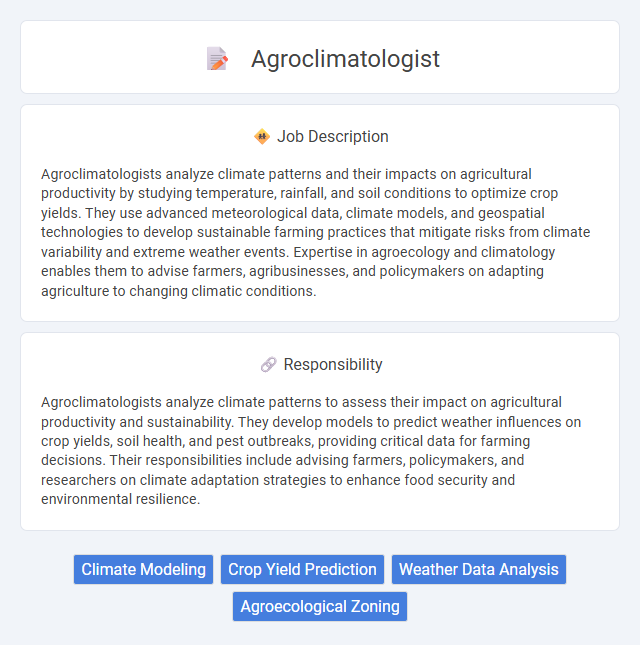
Agroclimatologists analyze climate patterns and their impacts on agricultural productivity by studying temperature, rainfall, and soil conditions to optimize crop yields. They use advanced meteorological data, climate models, and geospatial technologies to develop sustainable farming practices that mitigate risks from climate variability and extreme weather events. Expertise in agroecology and climatology enables them to advise farmers, agribusinesses, and policymakers on adapting agriculture to changing climatic conditions.
Individuals with a strong interest in agriculture, environmental science, and data analysis are likely to find a career as an agroclimatologist suitable. Those who can handle working outdoors in various weather conditions while interpreting complex climate data may have a higher probability of success. People who enjoy problem-solving regarding crop production and climate impacts might feel particularly fulfilled in this role.
Qualification
Agroclimatologists require a strong foundation in atmospheric sciences, agriculture, and environmental studies, typically holding a bachelor's or master's degree in agroclimatology, meteorology, or agronomy. Proficiency in data analysis, climate modeling software, and geographic information systems (GIS) is essential for assessing climate impacts on crop production. Practical experience through internships or research projects in agricultural ecosystems and climate variability enhances job readiness in this specialized field.
Responsibility
Agroclimatologists analyze climate patterns to assess their impact on agricultural productivity and sustainability. They develop models to predict weather influences on crop yields, soil health, and pest outbreaks, providing critical data for farming decisions. Their responsibilities include advising farmers, policymakers, and researchers on climate adaptation strategies to enhance food security and environmental resilience.
Benefit
Agroclimatologists likely offer significant benefits by improving agricultural productivity through the analysis of climate patterns and their effects on crop growth. Their expertise probably helps farmers optimize planting schedules and irrigation strategies, reducing risks associated with weather variability. Employing agroclimatologists may also contribute to sustainable farming practices by anticipating climate impacts and guiding adaptive measures.
Challenge
Agroclimatologists likely face the challenge of accurately predicting the impact of climate variability on crop production, which is complex due to changing weather patterns. They probably need to integrate diverse datasets and models to advise farmers on optimizing planting schedules and resource use. Managing uncertainties in climate forecasts could be a significant hurdle in providing reliable recommendations for sustainable agriculture.
Career Advancement
Agroclimatologists specializing in analyzing climate impacts on agriculture can advance their careers by gaining expertise in climate modeling, data analysis, and sustainable farming practices. Pursuing advanced degrees such as a Master's or Ph.D. in agroclimatology or environmental sciences increases opportunities for leadership roles in research institutions, government agencies, and agribusiness companies. Developing skills in geographic information systems (GIS) and collaborating on interdisciplinary projects further enhances prospects for senior scientist or policy advisor positions.
Key Terms
Climate Modeling
Agroclimatologists specializing in climate modeling analyze historical and current climate data to predict agricultural impacts and optimize crop management strategies. They develop and utilize advanced climate models that simulate temperature, precipitation, and atmospheric conditions influencing crop growth and soil health. Their expertise supports sustainable farming practices by providing accurate climate forecasts and risk assessments critical for decision-making in agriculture.
Crop Yield Prediction
Agroclimatologists analyze weather patterns and soil conditions to improve crop yield prediction models, using advanced data analytics and climate simulation tools. They integrate climate variables such as temperature, precipitation, and solar radiation with crop growth cycles to forecast agricultural productivity accurately. Their expertise supports farmers and policymakers in optimizing planting schedules and mitigating risks related to climate variability.
Weather Data Analysis
Agroclimatologists specialize in analyzing weather data to assess its impact on agricultural productivity and environmental sustainability. By interpreting temperature patterns, precipitation levels, and drought frequency, they provide critical insights for crop management and risk mitigation. Their expertise in weather data analysis supports optimized planting schedules and resource allocation, enhancing food security and resilience against climate variability.
Agroecological Zoning
Agroclimatologists specializing in agroecological zoning analyze climate patterns and soil data to classify land suitability for various agricultural practices, enhancing crop productivity and sustainability. They integrate meteorological records, geographic information systems (GIS), and biophysical parameters to develop detailed agroecological maps that guide land use planning and agricultural decision-making. Their work supports climate-resilient farming strategies by identifying optimal crop zones and mitigating environmental risks.
 kuljobs.com
kuljobs.com